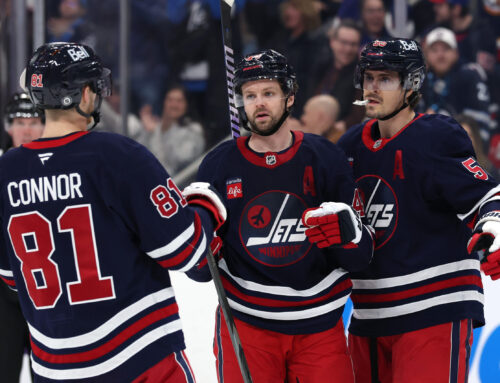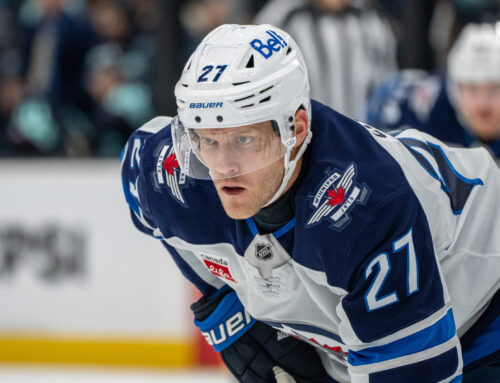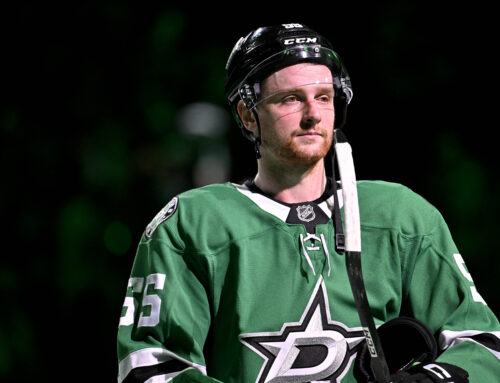
Let’s take a close look at Mikael Granlund’s season.
Between the Olympics, finding chemistry on a line with Zach Parise and Jason Pominville and scoring an amazing goal to win Game 3 versus Colorado last year was Mikael Granlund's coming out party. He was expected to take another step forward this year and build upon his 53-point pace from last year. Instead Granlund has dropped from .67 to .55 points per game. This column will look at Granlund's season and in an attempt to figure out what went wrong for Granlund and whether there are serious reasons to worry.
Is it his linemates?
|
Year |
Line |
TOI Together |
GF60 |
CF60 |
Sh% |
OZ% |
|
2013-14 |
Granlund/Pominville/ Parise |
232:37 |
3.10 |
67.06 |
7.55 |
65.3 |
|
2013-14 |
Granlund/Niederreiter/ Pominville |
207:33 |
3.47 |
47.90 |
12.63 |
58.5 |
|
2014-15 |
Parise/Granlund/ Pominville |
303:59 |
3.55 |
67.48 |
9.42 |
61.4 |
|
2014-15 |
Granlund/Vanek/ Parise |
137:36 |
3.05 |
51.43 |
11.29% |
69.5 |
There has not been much of a change to Granlund's linemates as Parise and Pominville have been featured most commonly on his wings. The two most common variations of lines that Granlund has played on have also produced at levels very similar to last year. The Parise/Granlund/Pominville trio have been one of the most efficient scoring lines in the league. Their numbers compare favourably to other high profile lines such as Bergeron/Marchand/Smith, Toews/Hossa/Saad and Ovechkin/Backstrom/(Insert Name Here).
Since Granlund's linemates have not change it is necessary to examine whether Granlund is just a passenger on the various lines. This can be done by comparing Granlund's numbers on his own to Parise's and Pominville's numbers without Granlund. This works out pretty well for Granlund, as he has a 3.38 GF60 (Goals For per 60 Minutes) on 57.7% offensive zone starts. By comparison, Parise has a GF60 of 2.38 on 62.5% zone starts while Pominville has a GF60 of 2.76 on 62.2% zone starts. The same thing can be found when looking at Granlund's numbers with Parise and Vanek. In fact the passenger on that line looks to be Thomas Vanek, as both Granlund and Parise fare much better without Vanek.
SF60
EV IPP
2013-14
63
8
33
8.9&
10.4
1.65
29.0
84.9
2014-15
54
7
23
7.7%
9.9
1.46
35.0
53.5
The first thing that stands out is that Granlund is shooting less this year than he did last year, which is saying something because his shooting numbers last year were pretty anemic. Add in a slightly lower shooting percentage and it is no surprise that Granlund is not putting up much in the way of goals. Granlund, however, plays a pass first style of game so goal scoring was never going to be his strongest statistical category. That being the case it is all the more worrying that his assist rate has fallen from just over half an assist per game to two every five games. This is weirder still, considering that the Wild are taking an extra shot for every 10 minutes and scoring an extra 0.6 goals for every 60 minutes Granlund is on the ice. That being the case, Granlund's point per game should not have fallen from 0.65 points per game to 0.55 points per game.
The dichotomy between Granlund's rate of production and the rate at which the Wild score when he is on the ice can be seen in his low IPP (the percentage of the goals for that a player is a part of when on the ice). Granlund is only a part of just over 50% of the goals the Wild score at even strength when he is on the ice. Conversely Parise and Pominville both have even strength IPP's over 70. I do not get a chance to see many Wild games, and do not have Gamecenter Live, so I watched highlights of Wild goals scored by, or involving, Parise and Pominville at even strength over the last month. I kept it to the goals where Granlund did not get a point and I found that in many of those goals Granlund either touched the puck or was involved directly in the goal. This is not to suggest that Granlund deserved a point and was not credited, rather that he was involved either in gaining a zone entry, cycling the puck or causing a turnover in most of the goals. The low IPP would be more concerning if he was floating around the perimeter uninvolved in the play.
The big drop in points this year for Granlund has been on the power play. With only five power play points in 54 games, his power play production has been pitiful. Granlund does not shoot on the power play. He has only 30 shots on the power play since the beginning of last year. Comparatively, Niederreiter and Charlie Coyle play fewer minutes on the power play but have as many if not more shots than Granlund. This means that on the power play he relies on others for his points. This year, his on-ice shooting percentage on the power play, down from 16% to 8%, is lower than his even strength on-ice shooting percentage.
How does he compare to other pass first centers?
|
Points |
PP Points |
EVTOI |
PPTOI |
Shots/game |
SF60 |
EV IPP |
|
|
Granlund |
30 |
5 |
14:30 |
2:06 |
1.46 |
35.2 |
53.5 |
|
Spezza |
53 |
20 |
12:48 |
3:30 |
2.51 |
38.9 |
60.0 |
|
Backstrom |
68 |
29 |
15:12 |
3:18 |
2.00 |
35.0 |
77.3 |
|
Ribeiro |
54 |
11 |
14:54 |
2:54 |
1.20 |
39.0 |
70.9 |
|
Thornton |
57 |
18 |
13:42 |
3:06 |
1.59 |
39.9 |
81.8 |
Thornton, Spezza, Backstrom and Ribeiro were chosen for comparison because they are some of the most productive pass-first centers in the league. There are two areas where Granlund is notably different from the other centers in this group: power play time and IPP. These two areas are notable, as Granlund gets fewer of his points on the power play than any of the other centers. Ribeiro is the only one who is close, and the only other center under three minutes of power play. Ribeiro makes up for this with a significantly higher IPP of 70.9. Conversely Jason Spezza is the only other center with an IPP under 70 but he gets the most power play time and as such has the second-most power play points of the five centers. Spezza can be seen as the inverse of Granlund, as he gets second line even strength minutes but first line power play minutes. From this, it is evident that for a pass-first center it is important to either be a key offensive cog at even strength or to get top unit power play minutes.
If it is necessary for Granlund toget top unit power play minutes, there is a problem as the only time he has been able to wrest away the top unit center job from Mikko Koivu is through prolonged injury. The good news for Granlund owners is that since the beginning of February he has 15 points in 21 games, half his points on the season. Over that span, Granlund has seen his IPP increase to close to 60. That would be good news, except that the Wild have been scoring 4.27 goals per 60 with Granlund on the ice over that same period, meaning that for Granlund to score at a 60 point pace the Wild have to score at a largely unsustainable pace. Last year only Jamie Benn and Ryan Getzlaf managed to sustain a GF60 above four.
What does this mean?
It means that Granlund's actually playing better this year than he did last year. Last year he was in on 85% of the goals the Wild scored when he was on the ice, and he had 29 even strength points in 63 games. This year with his IPP down to 53.5%, he has 25 points in 54 and is producing at a very slightly better pace at even strength than he did last year. Without top unit power play minutes, Granlund will be hard pressed to break 60 points without significant amounts of luck. As long as Mikko Koivu keeps getting well over 60% of the available power play time it could be a long wait before Granlund reaches his potential.
Trending Down (2014-15) Part 2
Trending Down (2014-15) Part 1





 T.B
T.B STL
STL ANA
ANA BUF
BUF DET
DET NYI
NYI MIN
MIN CAR
CAR CBJ
CBJ FLA
FLA
